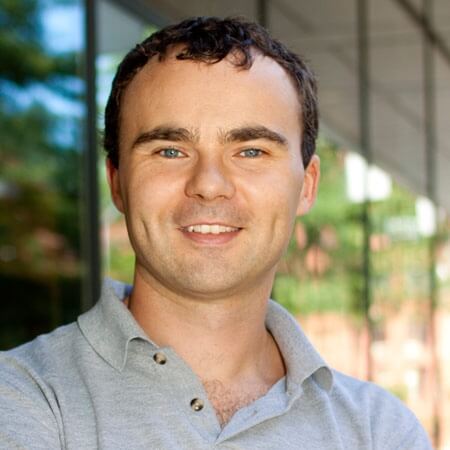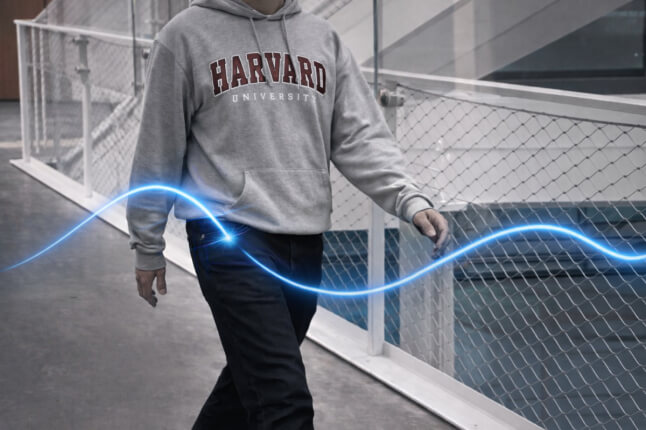News
Conor Walsh is Assistant Professor of Mechanical and Biomedical Engineering at Harvard SEAS and a Core Faculty Member at the Wyss Institute. (Photo by Eliza Grinnell, Harvard SEAS.)
Cambridge/Boston, Mass. – March 25, 2015 – Conor J. Walsh, Assistant Professor of Mechanical and Biomedical Engineering at Harvard School of Engineering and Applied Sciences (SEAS) and a Core Faculty Member at the Wyss Institute for Biologically Inspired Engineering at Harvard University, has been selected to receive a Faculty Early Career Development (CAREER) Award from the National Science Foundation (NSF). One of the most prestigious honors recognizing early-career scientists and engineers, the award will support Walsh's research in the burgeoning field of soft wearable robotics.
The award is from NSF’s General and Age Related Disabilities Engineering (GARDE) program, which advances fundamental engineering research that will lead to the development of new technologies, devices, or software for persons with disabilities.
Soft robotics combines robotics, design, chemistry, advanced manufacturing, and the mechanics of materials to solve problems in a range of application areas. Walsh’s work focuses on applying soft robotic systems to help individuals overcome disabilities, and to augment the performance of able-bodied people.
“Traditional robotic systems don’t translate easily from industrial settings to medical and home applications,” Walsh said. “One of the main reasons is because rigid components pose safety risks for people. We are overcoming that hurdle by designing soft robotic systems made of elastomers, fibers and textiles. A major aim of this work is to advance the state of the art of wearable robotics and intuitive human-robot interaction.”
The $500,000 CAREER Award will enable Walsh and his team to pursue work on a lightweight, soft robotic glove that could become an alternative to a therapist manipulating a patient’s fingers and thumb to rehabilitate impaired hand function, or provide a patient with assistance in performing activities of daily living. Equipped with soft actuators with integrated sensors, the robotic glove device will mimic the way that the human hand contracts, extends, bends, and twists. The project will allow the team to test improvements in key components of a soft robotics platform, including sensing, calibration, actuation, and control. Not only does the technology hold the promise of improved and more accessible therapy for patients, the sensing techniques could offer important new ways to characterize the progression of an individual’s abilities over time.
Walsh’s team will collaborate with clinical partners to test prototypes of the system on a variety of patients, such as those who have suffered a stroke or have muscular dystrophy.
Walsh’s research lab at Harvard SEAS and the Wyss Institute brings together researchers from the engineering, industrial design, apparel, clinical, and business communities and focuses on applying disruptive technologies to the development of robotic devices for augmenting and restoring human performance. Current research is focused on the design, manufacture, and control of wearable robotic devices and characterizing their performance through biomechanical and physiological studies. His team is also developing a soft exosuit that can assist an individual with locomotion as part of the DARPA Warrior Web project. His group is also working on the modeling and design of fluidic-based soft robotics for cardiac applications and applying meso-scale manufacturing approaches to the design of smart medical tools for the minimally invasive diagnosis and treatment of disease. Leveraging technology development expertise at the University and the Wyss Institute, Walsh's research follows a translational model that ensures potentially life-changing advances are well positioned to make a real-world impact when they exit the lab.
A core aspect of Walsh’s research is a commitment to open-source dissemination of results. Last year, he and collaborators launched the Soft Robotics Toolkit, an online collection of downloadable, open-source plans, how-to videos, and case studies to assist users in the design, fabrication, modeling, characterization, and control of soft robotic devices. As part of his CAREER Award, Walsh will continue to add to instructional kits intended to enable technical literacy, build student confidence, and provide a means for students from all backgrounds to quickly develop innovative soft robots.
Through the Harvard Medical Device Innovation Initiative, that includes ES227, Medical Device Design, a course that Walsh started at SEAS, he provides student-innovators with the opportunity to solve critical medical problems. Undergraduate and graduate level students collaborate with clinicians at Boston-area teaching hospitals, as well as with medical professionals in low-resource environments such as India. The student-clinician teams partner to identify a critical need and design, prototype, and test a solution appropriate to the setting. As part of his CAREER Award, Walsh will introduce cutting-edge soft robotics research topics into his class.
He received his undergraduate degree in Mechanical and Manufacturing Engineering from Trinity College in Dublin (2003), and a Master’s (2006) and Ph.D. (2010) in mechanical engineering from the Massachusetts Institute of Technology. He joined the Harvard SEAS faculty and the Wyss Core Faculty in 2012.
About the NSF Faculty Early Career Development (CAREER) Program
The National Science Foundation's Faculty Early Career Development (CAREER) Program is a Foundation-wide activity that offers the NSF's most prestigious awards in support of the early career-development activities of those teacher-scholars who most effectively integrate research and education within the context of the mission of their organization. Such activities should build a firm foundation for a lifetime of integrated contributions to research and education. NSF encourages submission of CAREER proposals from junior faculty members at all CAREER-eligible organizations and especially encourages women, members of underrepresented minority groups, and persons with disabilities to apply.
Topics: Robotics, Health / Medicine, Awards
Cutting-edge science delivered direct to your inbox.
Join the Harvard SEAS mailing list.
Press Contact
Paul Karoff



